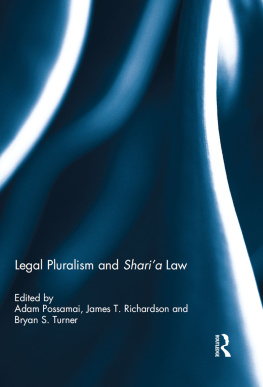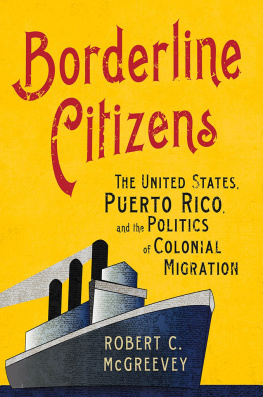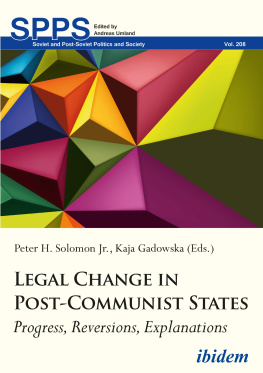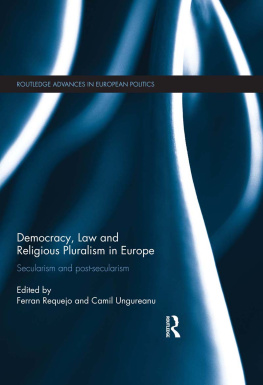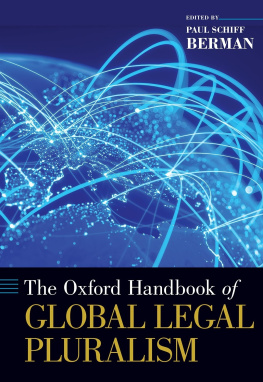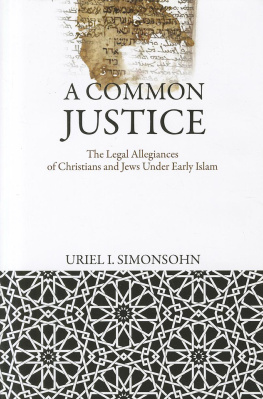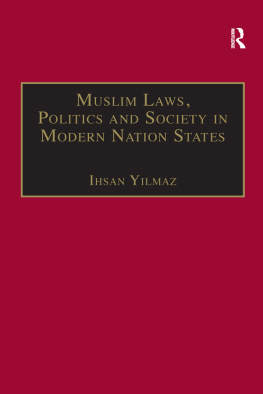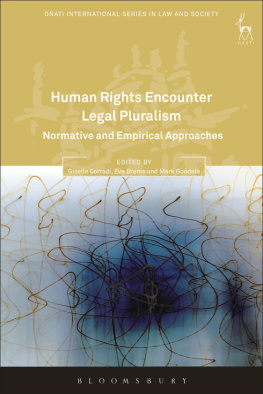Legal Pluralism and Sharia Law
Legal pluralism has often been associated with post-colonial legal developments especially where common law survived alongside tribal and customary laws. Focusing on Sharia, this book examines the legal policies and experiences of various societies with different traditions of citizenship, secularism and common law. Where large diasporic communities of migrants develop, there will be some demand for the institutionalization of Sharia at least in the resolution of domestic disputes. This book tests the limits of multiculturalism by exploring the issue that any recognition of cultural differences might imply similar recognition of legal differences. It also explores the debate about postsecular societies specifically to the presentation and justification of beliefs and institutions by both religious and secular citizens.
This book was published as a special issue of Democracy and Security.
Adam Possamai is Associate Professor in Sociology at the University of Western Sydney and is the current President of Research Committee 22 on the Sociology of Religion from the International Sociological Association.
James T. Richardson, J.D., PhD is the Foundation Professor of Sociology and Judicial Studies at the University of Nevada, Reno and the President Elect of the Society for the Scientific Study of Religions.
Bryan S. Turner is the Presidential Professor of Sociology and the Director of the Committee on Religion at the Graduate Center of the City University of New York, and concurrently the Director of the Centre on Religion and Society at the University of Western Sydney.
Legal Pluralism and Sharia Law
Edited by
Adam Possamai, James T. Richardson and Bryan S. Turner
First published 2014
by Routledge
2 Park Square, Milton Park, Abingdon, Oxon, OX14 4RN
Simultaneously published in the USA and Canada
by Routledge
711 Third Avenue, New York, NY 10017
Routledge is an imprint of the Taylor & Francis Group, an informa business
2014 Taylor & Francis
This book is a reproduction of Democracy and Security, vol. 7, issue 4. The Publisher requests to those authors who may be citing this book to state, also, the bibliographical details of the special issue on which the book was based.
All rights reserved. No part of this book may be reprinted or reproduced or utilised in any form or by any electronic, mechanical, or other means, now known or hereafter invented, including photocopying and recording, or in any information storage or retrieval system, without permission in writing from the publishers.
Trademark notice: Product or corporate names may be trademarks or registered trademarks, and are used only for identification and explanation without intent to infringe.
British Library Cataloguing in Publication Data
A catalogue record for this book is available from the British Library
ISBN 13: 978-0-415-82633-4
Typeset in Sabon
by Taylor & Francis Books
Publishers Note
The publisher would like to make readers aware that the chapters in this book may be referred to as articles as they are identical to the articles published in the special issue. The publisher accepts responsibility for any inconsistencies that may have arisen in the course of preparing this volume for print.
Contents
Bryan S. Turner, Adam Possamai, and James T. Richardson
Bryan S. Turner
Malcolm Voyce and Adam Possamai
Jan A. Ali
Jamila Hussain
James T. Richardson
The chapters in this book were originally published in Democracy and Security, volume 7, issue 4 (December 2011). When citing this material, please use the original page numbering for each article, as follows:
Chapter 1
Introduction
Bryan S. Turner, Adam Possamai, and James T. Richardson
Democracy and Security, volume 7, issue 4 (December 2011) pp. 311316
Chapter 2
Legal Pluralism, State Sovereignty, and Citizenship
Bryan S. Turner
Democracy and Security, volume 7, issue 4 (December 2011) pp. 317337
Chapter 3
Legal Pluralism, Family Personal Laws, and the Rejection of Sharia in Australia: A Case of Multiple or Clashing Modernities?
Malcolm Voyce and Adam Possamai
Democracy and Security, volume 7, issue 4 (December 2011) pp. 338353
Chapter 4
A Dual Legal System in Australia: The Formalization of Sharia
Jan A. Ali
Democracy and Security, volume 7, issue 4 (December 2011) pp. 354373
Chapter 5
More Than One Law for All: Legal Pluralism in Southeast Asia
Jamila Hussain
Democracy and Security, volume 7, issue 4 (December 2011) pp. 374389
Chapter 6
The Social Construction of Legal Pluralism
James T. Richardson
Democracy and Security, volume 7, issue 4 (December 2011) pp. 390405
Bryan S. Turner,
Department of Sociology, The Graduate Center, City University of New York, New York, New York
Centre for the Study of Contemporary Muslim Societies, University of Western Sydney, Australia
Grant Sawyer Center for Justice Studies, University of Nevada, Reno, Nevada
Legal pluralism presents a complex theory of legal change, rendering any simple definition problematic. For the purposes of this introduction however, we may say that legal pluralism involves the presence of different legal traditions and institutions within a single political framework such as a state, thereby raising problems about how laws might be enforced and recognizing the prospect of contradictory traditions. The analysis of legal pluralism is often associated in modern legal theory with both the impact of globalization and with the cultural consequence of postmodernism. These two aspects are often combined into a single argument. It is argued that, with the rise of nation states through much of the nineteenth century, the sovereignty of states became a major issue leading to the development of modern taxation systems, a common language for the public domain, and the assertion of a single and integrated legal system. This rationalization of the law typically involved a critique of customary legal traditions. A unified sovereign state required a rational system of law based on the authority of secular courts with the backing of the state apparatus. With the growing intensity of globalization, it is now claimed that states have become more porous and more interconnected in global economic networks. The consequence is that states have to embrace legal pluralism arising from international laws on trade, labor laws, human rights legislation, and the workings of international courts such as the court of criminal justice and the European Court of Human Rights.
Postmodern jurisprudence has warmed to the idea of legal pluralism because it underpins the general postmodern argument that contemporary societies are becoming more complex and more fragmented. As a result the notion from the Enlightenment that law could provide a universal and timeless framework for the adjudication of disputes and general enforcement of social order has been seriously challenged by the complexity of late modern society. Postmodern philosophers have often found support from cultural anthropologists who have noted that in many colonial and postcolonial societies there are many forms of law surviving within a single polity such as aboriginal and Native American practices, customary laws, common law, and the laws arising from new constitutions.

